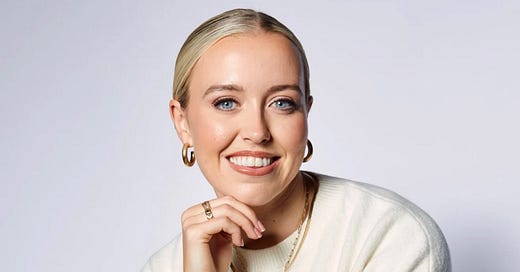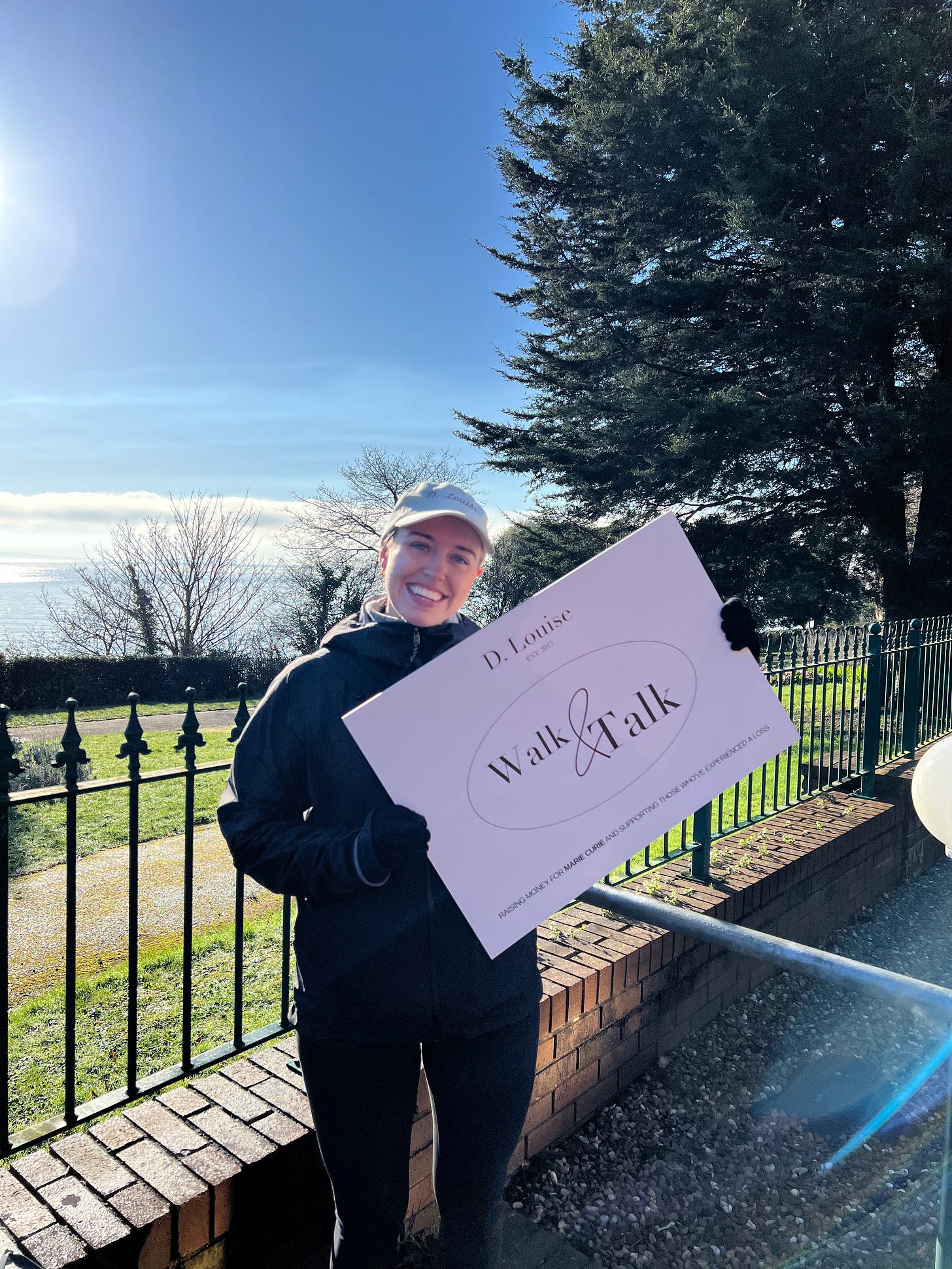If you enjoy this newsletter, consider pressing the ❤️ button at the end of the article. It allows more people to find my work!
When my father sat me down and told me he had an incurable form of bone cancer seven years ago, one of the first things I wanted to do was walk. There was an urgency to it—whether to create some kind of physical distance between what I’d just been told, or because stomping through the countryside is simply my default way of dealing with things, it was the only thing I could think of in that moment that might help me cling on to this new, horribly upturned world.
For Olivia Jenkins, founder of globally-renowned jewellery brand D.Louise and Forbes 30 Under 30 entrepreneur, the experience was similar. After losing her mother in 2017 and her brother only four years later, walking became a way to navigate her grief, but also a way to find community—connecting with people who understand, but may never have had the means or the outlet to express themselves.
This week, I had the pleasure of sitting down with Olivia to talk about her experiences of grief, as well as her incredible initiative Walk & Talk—returning this March for its second year, which you can get involved in.
Alanna: Hi Olivia! Firstly, can you tell us a bit more about how you came to start D.Louise, now a bestselling jewellery brand?
Olivia: Like many people, I struggled during Covid. Having already lost my mum, I was also lacking purpose in my career, struggling day-to-day with my mental health, and generally feeling unsure what I wanted to do with my life.
It was actually my partner who suggested I start a business. At first, I thought he was crazy. Like, how am I going to start a business? I don’t know anything about accounting! What product would I sell? But the idea had been planted, and eventually grew into D.Louise. I’ve loved jewellery since I was very young and admired how it can become so personal to an individual. So it made sense that jewellery would be the right fit for me.
Naming the brand after my mum was also meaningful. From the beginning, D.Louise felt like a way to give some purpose to my grief—but also to keep me accountable. Because if I gave up or it all went wrong, I knew she would kill me!
A: Now, about your initiative Walk & Talk. In essence, it’s a 313 km walk from Cardiff to London, covering a marathon a day for eight days and raising money for Marie Curie. But it’s much more than that in practice, isn’t it? Can you tell us more about it, and how your own experience of grief led you to create it?
O: Losing my mum and brother made me realise how little support exists for those navigating grief. It’s really hard to talk about and often feels like this taboo subject, even for people who have been through similar experiences. But walking changes that. You can’t hide behind your phone, but equally, you’re not looking someone in the eye. I don’t know about you, but those grief groups - where you sit in a circle and talk about your loss - are my idea of hell. So, Walk & Talk is my way of breaking through the grief stigma, but also giving people a comfortable space to express themselves. That doesn’t mean you have to come along and talk about all your problems, but it’s a safe space to do that if you want to.
Starting from Cardiff (last year, we set off from the hospice that my mum was in at the end of her life) and ending up in London where I moved to, the route itself reflects my grief journey. People take part in as much or as little as they like, joining from various places along the route and transforming a charity walk into a powerful space for conversation, reflection and community. It’s a place where healing happens, quite literally, one step at a time.
A: It sounds like the ideal scenario to begin talking about grief for anyone who might find it difficult. Have you seen people open up in this way?
O: Absolutely. There are so many individual stories I could tell, but generally, at the start of each day, no one knows anyone, then by the end of the day everyone’s like “Oh my god, we should go for dinner.” People talk about things they’ve never spoken about before, and in turn, I’ve learned so much about other people through their stories. We had one woman come who had just lost her mum and, initially, she was only planning on walking for an hour. But she ended up doing a whole day in honour of her mum. Similarly, we had a videographer who was just there to film content, and to begin with, he was working quietly in the background. But by the end of the day, he found he could open up about the loss of his auntie, which he’d never spoken about before.
A: What is it about walking, do you think, that makes it such an effective way to process loss?
O: For me, it’s the headspace that it offers. I love going on a walk with no headphones, and just having that space to be alone. I also need the open space, the greenery. It’s sitting with myself and figuring out my thoughts in a way that doesn’t have to be spoken in front of a therapist, or anyone else. And just being outside in the fresh air always gives you a really good feeling. I've never regretted going for a walk, ever.
A: Do you have any advice for people who are currently in the weeds when it comes to grief?
O: With grief, people have a lot of opinions, but that doesn't always mean that they have the right opinion. You need to learn what works for your grief and act upon that, no matter what that looks like. Allow yourself to feel confident in yourself—to go and do whatever works best for you, versus what’s recommended.
I think community for grief is also super important, but I don't think it needs to be one size fits all. Everyone grieves in different ways, and what’s comfortable for one person might not work for another, so learn what works for you.
A: Walk & Talk sounds like a great place for people to start finding their grief community. So, how can we get involved?
O: You can kindly donate via our Just Giving page. Last year we raised £13,000 and I've set the punchy target of £30,000 this year, which I know is a lot, but I have a real strong feeling that we're going to achieve it! As mentioned, it's to support Marie Curie and their end of life care. Because, for anyone who has gone through grief, you’ll know that the end is very tricky to navigate. And for me, Marie Curie was absolutely amazing during that time.
Alongside this, we’d also love to see you there in person! There’s a walking route on our website showing you where and when to join, and tickets can be purchased from our Eventbrite page. You don’t have to be bereaved to join either, you can come along to learn, show support, or just meet some amazing people.
Huge thank you to Olivia for sharing her story and for creating such a compassionate means for bereaved people to connect with each other in a safe, comfortable space. I’ll personally be aiming to join the last leg of her journey, from Uxbridge to London on Mother’s Day, so do come along and join us if you can! As Olivia said to me, “Life is often crap. But we’re in it together.”









This was a beautiful read. I love how the concept creates a comfortable space within something that can feel so uncomfortable. 💕✨
This was a lovely read, Alanna. Thank you to you and Olivia for sharing ❤️
I'm not sure if you'd read The Salt Path but I would recommend it. Someone in my book club read it for Memoir May and it follows a couple who turn to walking after one of them is diagnosed with a terminal illness. It might be a bit too on the nose for you but it tells a great story of how powerful nature and walking are in times of need.